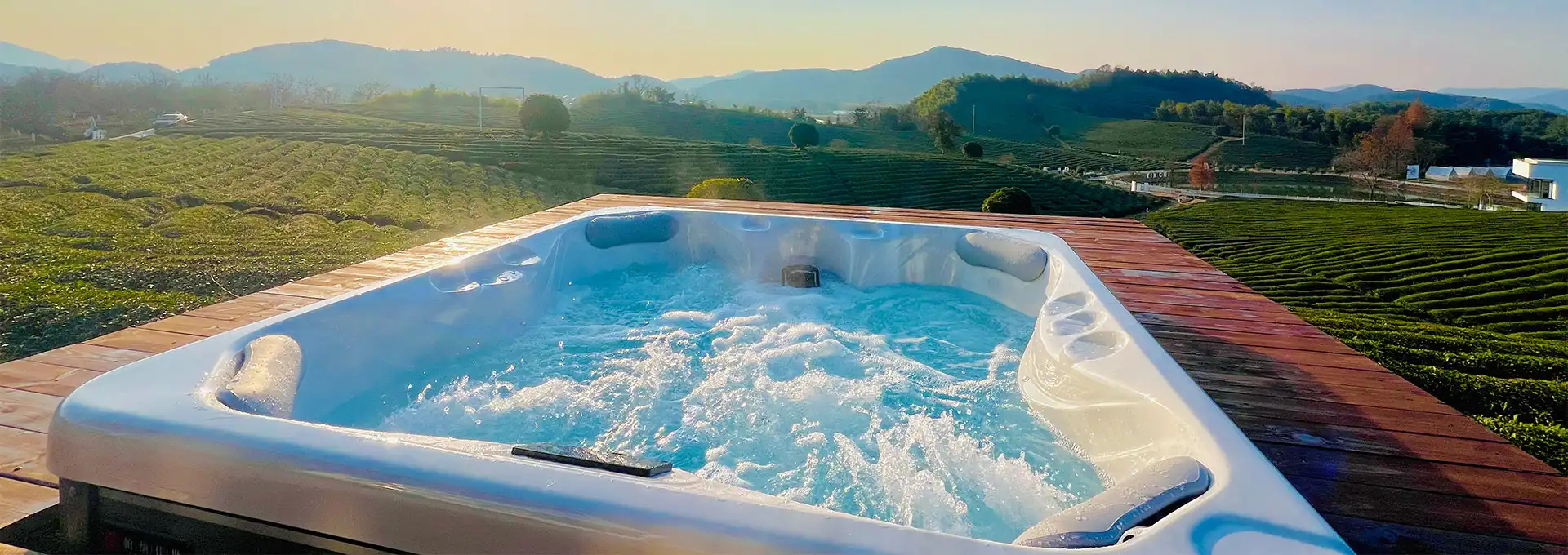Does a Hot Tub Dehydrate You?
Outdoor hot tubs are a luxurious way to relax and unwind, but they can also have some unexpected effects on your body. One common question that arises is whether soaking in a hot tub can lead to dehydration. This article aims to explore this topic in-depth, examining the potential risks and providing tips for staying hydrated while enjoying the therapeutic benefits of a hot tub.
How Does a Hot Tub Affect Hydration Levels?
Spending time in a hot tub can indeed lead to dehydration if proper precautions are not taken. The high temperature of the water causes your body to sweat, resulting in fluid loss. Additionally, the heat can increase your heart rate and blood flow, which can further contribute to dehydration. This is especially true if you consume alcoholic beverages or spend extended periods in the hot tub.
To understand the potential impact on hydration levels, it's essential to consider the physiological processes that occur when you soak in a hot tub. The elevated water temperature causes your body to dilate blood vessels near the skin's surface, increasing blood flow and perspiration. This perspiration leads to the loss of water and electrolytes, which can result in dehydration if not replenished.
Moreover, the hot water can cause you to perspire without realizing it, as the water vapor can mask the sensation of sweating. This can lead to significant fluid loss before you even become aware of it, exacerbating the risk of dehydration. The warmer the water temperature, the greater the potential for dehydration.
What Are the Signs and Symptoms of Dehydration from Hot Tub Use?
Recognizing the signs and symptoms of dehydration is crucial to prevent any potential health risks associated with outdoor hot tub use. Some common indicators of dehydration include:
1. Thirst: One of the most obvious signs of dehydration is an intense feeling of thirst. As your body loses fluids, it signals the need for replenishment through the sensation of thirst.
2. Dry mouth and lips: When you're dehydrated, your body lacks sufficient fluids to produce saliva, leading to a dry mouth and cracked or chapped lips.
3. Headache: Dehydration can cause blood volume to decrease, reducing the flow of oxygen and nutrients to the brain, resulting in headaches or even dizziness.
4. Fatigue and weakness: Dehydration can lead to a significant drop in energy levels, causing you to feel fatigued and weak.
5. Dark-colored urine: Well-hydrated individuals typically have pale or light-colored urine. If your urine appears dark yellow or amber, it may be an indication of dehydration.
6. Muscle cramps: Electrolyte imbalances caused by dehydration can contribute to muscle cramps, particularly in the legs and abdominal area.
7. Decreased urination: When you're dehydrated, your body tries to conserve water, leading to a decrease in urination frequency and volume.
8. Dry skin: Dehydration can cause your skin to become dry, flaky, and less elastic.
9. Rapid heart rate: As your body tries to compensate for fluid loss, your heart may beat faster to maintain adequate blood flow.
10. Dizziness or lightheadedness: Severe dehydration can lead to a drop in blood pressure, causing you to feel dizzy or lightheaded, especially when standing up quickly.
It's important to note that some individuals may experience these symptoms more severely than others, depending on various factors such as age, overall health, and tolerance to heat stress.
Tips for Staying Hydrated While Using a Hot Tub
While outdoor hot tubs can be enjoyable, it's essential to take preventive measures to maintain proper hydration levels. Here are some tips to help you stay hydrated while soaking in a hot tub:
1. Drink water before and after: Ensure you drink plenty of water before and after your hot tub session. This will help replenish any fluids lost during the soak and prevent dehydration. It's recommended to drink at least 8 ounces (240 ml) of water for every 15-20 minutes spent in the hot tub.
2. Limit your time in the hot tub: Prolonged exposure to the hot water can increase the risk of dehydration. It's recommended to limit your time in the hot tub to 15-30 minutes at a time, especially if the water temperature exceeds 104°F (40°C).
3. Avoid alcohol: Consuming alcoholic beverages can exacerbate dehydration by acting as a diuretic and increasing fluid loss. It's best to avoid alcohol consumption while using a hot tub.
4. Stay cool: Take breaks from the hot tub and allow your body to cool down periodically. This will help reduce the amount of sweating and fluid loss. Consider stepping out of the tub and cooling off with a cold towel or a cool shower.
5. Replenish electrolytes: Consider drinking electrolyte-rich beverages, such as sports drinks or coconut water, to replace the electrolytes lost through perspiration. Electrolytes like sodium, potassium, and magnesium are essential for proper hydration and muscle function.
6. Monitor your urine color: Keep an eye on the color of your urine. If it appears dark yellow or amber, it's a clear sign that you need to increase your fluid intake.
7. Listen to your body: Pay attention to any signs of dehydration, such as dizziness, headaches, or muscle cramps, and get out of the outdoor hot tub immediately if you experience these symptoms.
8. Adjust water temperature: If you find yourself sweating excessively or experiencing symptoms of dehydration, consider lowering the water temperature slightly to reduce the strain on your body.
9. Eat hydrating foods: Before and after your hot tub session, consume water-rich foods like fruits and vegetables, which can help replenish fluids and electrolytes.
10. Wear loose, lightweight clothing: When you're not in the hot tub, wear loose, lightweight clothing to help your body cool down and minimize sweating and fluid loss.
By following these tips, you can enjoy the relaxing benefits of a hot tub while minimizing the risk of dehydration and ensuring a safe and comfortable experience.
Who is at Higher Risk of Dehydration from Hot Tub Use?
While anyone can become dehydrated from hot tub use, certain individuals may be at a higher risk and should take extra precautions. These groups include:
1. Elderly individuals: As we age, our bodies become less efficient at regulating body temperature and maintaining fluid balance, increasing the risk of dehydration.
2. Children: Children have a higher surface area-to-body mass ratio, which means they lose fluids more rapidly than adults. Their bodies are also less efficient at regulating temperature.
3. Pregnant women: Pregnancy can increase the risk of overheating and dehydration due to hormonal changes and the added strain on the body.
4. Those with certain medical conditions: Individuals with conditions like diabetes, heart disease, or kidney problems may have a compromised ability to regulate fluid balance and should consult their healthcare provider before using a outdoor hot tub.
5. Individuals taking certain medications: Some medications, such as diuretics, can increase fluid loss and dehydration risk.
If you fall into one of these higher-risk groups, it's essential to be extra vigilant about staying hydrated and limiting your time in the hot tub. Always consult with a healthcare professional if you have any concerns or underlying medical conditions.
By understanding the potential risks, recognizing the signs and symptoms of dehydration, and following preventive measures, you can enjoy the relaxing benefits of a hot tub while minimizing the risk of dehydration and ensuring a safe and enjoyable experience.
If you want to get more information about this product, you can contact us at info@iparnassus.com!
References:
1. "Dehydration and Hot Tubs: What You Need to Know" by Dr. Joseph Mercola
2. "Can Hot Tubs Cause Dehydration?" by Swim University
3. "Staying Hydrated in the Hot Tub" by HotSpring Spas
4. "Hot Tub Safety: Risks and Precautions" by Bullfrog Spas
5. "Dehydration and Heat Stress in the Hot Tub" by Master Spas
6. "Hydration and Hot Tub Use" by Jacuzzi
7. "The Importance of Hydration When Using a Hot Tub" by CalSpas
8. "Hot Tub Dehydration: Causes, Symptoms, and Prevention" by Aqua Living
9. "Hot Tub Dehydration: What You Need to Know" by SpaDepot.com
10. "Staying Hydrated in the Hot Tub: Tips and Tricks" by PureSpa
Send Inquiry
Related Industry Knowledge
- Redefining Hotel Hot Tubs with Advanced Water Treatment Solutions
- The Impact of Hot Tubs on Hotel Revenue in the Middle East
- Is Hot Tub Good for Recovery?
- Can a Swim Spa Go Inground?
- Can a Swim Spa Be Hot and Cold?
- Can I Put a Swim Spa in My Basement?
- Is a Hot Tub Good for COVID?
- What is a hot tub
- Will Ssd a Pay for a Swim Spa?
- How Do I Choose the Right Outdoor Swimming Spa Cover or Barrier to Comply With Safety Regulations?



